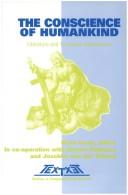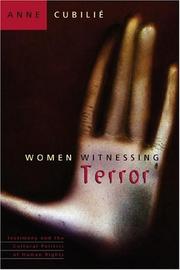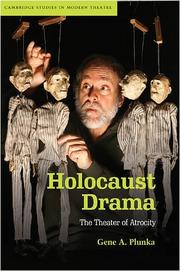| Listing 1 - 8 of 8 |
Sort by
|

ISBN: 9789004484085 9789042004207 Year: 2000 Publisher: Leiden; Boston : BRILL
Abstract | Keywords | Export | Availability | Bookmark
 Loading...
Loading...Choose an application
- Reference Manager
- EndNote
- RefWorks (Direct export to RefWorks)
The traumatic experiences of persecution and genocide have changed traditional views of literature. The discussion of historical truth versus aesthetic autonomy takes an unexpected turn when confronted with the experiences of the victims of the Holocaust, the Gulag Archipelago, the Cultural Revolution, Apartheid and other crimes against humanity. The question is whether - and, if so, to what extent - literary imagination may depart from historical truth. In general, the first reactions to traumatic historical experiences are autobiographical statements, written by witnesses of the events. However, the second and third generations, the sons and daughters of the victims as well as of the victimizers, tend to free themselves from this generic restriction and claim their own way of remembering the history of their parents and grandparents. They explore their own limits of representation, and feel free to use a variety of genres; they turn to either realist or postmodernist, ironic or grotesque modes of writing.

ISBN: 0823224341 082322435X 0823248674 0823293580 Year: 2005 Publisher: Fordham University Press
Abstract | Keywords | Export | Availability | Bookmark
 Loading...
Loading...Choose an application
- Reference Manager
- EndNote
- RefWorks (Direct export to RefWorks)
Atrocities in literature. --- Reportage literature --- State-sponsored terrorism. --- Women and war. --- Women authors --- History and criticism.
Book
ISBN: 9004399437 1848882211 Year: 2013 Publisher: Oxford, United Kingdom : Inter-Disciplinary Press,
Abstract | Keywords | Export | Availability | Bookmark
 Loading...
Loading...Choose an application
- Reference Manager
- EndNote
- RefWorks (Direct export to RefWorks)
Monsters --- Monsters in literature. --- Geographical perception --- Atrocities in literature. --- Social aspects. --- Psychological aspects.
Book
ISBN: 9780415890977 0415890977 9780203805190 9781136646386 9781136646331 9781136646379 9780415704045 0415704049 9786613462473 1136646388 1283462478 0203805194 113664637X Year: 2012 Volume: 2 Publisher: London ; New York Routledge
Abstract | Keywords | Export | Availability | Bookmark
 Loading...
Loading...Choose an application
- Reference Manager
- EndNote
- RefWorks (Direct export to RefWorks)
Book
ISBN: 9782356133304 2356133305 Year: 2020 Publisher: Bordeaux : Ausonius,
Abstract | Keywords | Export | Availability | Bookmark
 Loading...
Loading...Choose an application
- Reference Manager
- EndNote
- RefWorks (Direct export to RefWorks)
Ce travail vise à reconstituer la vision romaine de l'horreur, au sens d'émotion extrême de peur et de phénomène horrible. L'étude porte sur l'épopée et l'historiographie latines, afin de cerner l'originalité du thème, qui relève normalement de la tragédie, dans deux genres dont il est a priori exclu. La revue des termes désignant la peur permet d'abord d'établir le champ sémantique de l'horreur au sens d'émotion ; s'en extrait l'imaginaire de l'horreur au sens de phénomène, qui s'organise en thèmes et motifs centrés autour des notions de noirceur, de grandeur et de laideur, se partage entre vision péjorative et laudative (horror ad odium/ ad uenerationem) et relève du profane ou du sacré. Sur le plan esthétique, l'horreur pose des problèmes de transposition aux poètes épiques et aux historiens, particulièrement dans le domaine de la violence : pour rendre compte du caractère excessif des violences horribles, ils mobilisent des procédés d'amplification dérogeant aux attendus génériques, l'emphasis, l'euidentia et le tumor. Enfin, l'horreur perturbe l'horizon d'attente du lecteur : la delectatio qu'elle induit allie paradoxalement un goßt trivial pour le sensationnel et un plaisir intellectuel de reconnaissance des problématiques de la mimèsis, fonctionnant en aemulatio avec les arts littéraires, plastiques ou scéniques ; l'utilitas qu'elle recèle relève essentiellement du questionnement éthique, puisque l'horror ad uenerationem peut prêter le flanc à la critique, et l'horror ad odium donner lieu au grandissement ambigu du mal. Au final, la notion d'horreur se structure dans les deux genres autour de deux thématiques dont la symbolique interfère : les Enfers et les guerres civiles.
Horror in literature --- Latin literature - History and criticism --- Epic poetry, Latin - History and criticism --- Atrocities in literature --- Littérature latine --- Horreur --- Peur --- Épopées latines --- Historiographie --- Thèmes, motifs. --- Dans la littérature
Book
ISBN: 9783631674581 3631674589 Year: 2016 Publisher: Frankfurt am Main Peter Lang Edition
Abstract | Keywords | Export | Availability | Bookmark
 Loading...
Loading...Choose an application
- Reference Manager
- EndNote
- RefWorks (Direct export to RefWorks)
Book
ISBN: 9780253068804 9780253068798 Year: 2024 Publisher: Bloomington : Indiana University Press,
Abstract | Keywords | Export | Availability | Bookmark
 Loading...
Loading...Choose an application
- Reference Manager
- EndNote
- RefWorks (Direct export to RefWorks)
"An estimated 40,000 Jews were murdered during the Russian Civil War. How did Jewish poets and investigators in the 1920s make sense of such organized acts of violence (pogroms)? Brilliantly weaving together narrative fiction, poetry, memoirs, newspaper articles, and documentary reports, Harriet Murav argues that poets and pogrom investigators were doing more than recording the facts of violence and expressing emotions in response to it. They were interrogating what was taking place through a central concept familiar from their everyday lifeworld-hefker, or abandonment. Hefker shaped the documentation of catastrophe by Jewish investigators at pogrom sites impossibly tasked with producing comprehensive reports of chaos. Hefker also became a framework for Yiddish writers to think through such incomprehensible violence by creating new forms of poetry. Focusing less on the perpetrators and more on the responses to the pogroms, As the Dust of the Earth offers a fuller understanding of the seismic effects of such organized violence and a moving testimony to the resilience of survivors to process and cope with catastrophe"--
Pogroms in literature. --- Violence in literature. --- Atrocities in literature. --- Yiddish poetry --- Pogroms --- Jews --- LITERARY CRITICISM / Jewish --- RELIGION / Judaism / History --- Themes, motives. --- History --- Sources. --- Crimes against --- Psychological aspects. --- Ukraine --- Literature and the revolution. --- Atrocities --- Personal narratives.

ISBN: 9780521494250 0521494257 9780511576591 9780521182423 9780511517976 0511517971 0511576595 1107189381 0521182425 128210392X 9786612103926 0511515529 0511514433 0511516800 0511517483 9781107189386 6612103922 9780511515521 9780511514432 9780511516801 Year: 2010 Publisher: Cambridge [etc.] Cambridge University Press
Abstract | Keywords | Export | Availability | Bookmark
 Loading...
Loading...Choose an application
- Reference Manager
- EndNote
- RefWorks (Direct export to RefWorks)
The Holocaust - the systematic attempted destruction of European Jewry and other 'threats' to the Third Reich from 1933 to 1945 - has been portrayed in fiction, film, memoirs, and poetry. Gene Plunka's study will add to this chronicle with an examination of the theatre of the Holocaust. Including thorough critical analyses of more than thirty plays, this book explores the seminal twentieth-century Holocaust dramas from the United States, Europe, and Israel. Biographical information about the playwrights, production histories of the plays, and pertinent historical information are provided, placing the plays in their historical and cultural contexts.
Atrocities in literature. --- Atrocities in literature --- Drama --- Holocaust, Jewish (1939-1945), in literature --- Holocaust, Jewish (1939-1945) --- Jews in literature --- Memory in literature --- Theater --- Memory as a theme in literature --- Prison psychology --- History and criticism --- Psychological aspects --- History --- Holocaust, Jewish (1939-1945), in literature. --- Jews in literature. --- Memory in literature. --- History and criticism. --- Psychological aspects. --- Théâtre et guerre --- Shoah --- 20e siècle --- Au théâtre --- Théâtre et guerre --- 20e siècle --- Au théâtre
| Listing 1 - 8 of 8 |
Sort by
|

 Search
Search Feedback
Feedback About UniCat
About UniCat  Help
Help News
News